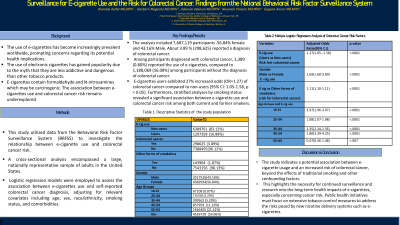Sunday Poster Session
Category: Colorectal Cancer Prevention
P0415 - Surveillance for E-Cigarette Use and the Risk for Colorectal Cancer - Findings from the National Behavioral Risk Factor Surveillance System United States
Sunday, October 27, 2024
3:30 PM - 7:00 PM ET
Location: Exhibit Hall E

Has Audio
- OA
Olamide Asifat, MD, MPH
Georgia Southern University
Statesboro, GA
Presenting Author(s)
Olamide Asifat, MD, MPH1, Hezborn Magacha, MD, MPH2, Adedeji Adenusi, MD, MPH3, Chisom Nwaneki, MD, MPH4, Eugene Annor, MD, MPH5
1Georgia Southern University, Statesboro, GA; 2East Tennessee State University Quillen College of Medicine, Johnson City, TN; 3Interfaith Medical Center, Brooklyn, NY; 4Saint Peter's University Hospital, New Brunswick, NJ; 5University of Illinois College of Medicine, Morton, IL
Introduction: The use of e-cigarettes has become increasingly prevalent worldwide, prompting concerns regarding its potential health implications. The use of electronic cigarettes has gained popularity because of the myth that it is less addictive and dangerous than other tobacco products. Studies show that e-cigarettes contain formaldehyde and N-nitrosamines which may be carcinogenic. While studies have linked traditional cigarette smoking with an increased risk of colorectal cancer, the association between e-cigarette use and colorectal cancer risk remains underexplored.
Methods: This study utilized data from the Behavioral Risk Factor Surveillance System (BRFSS) to investigate the relationship between e-cigarette use and colorectal cancer risk. A cross-sectional analysis encompassed a large, nationally representative sample of adults in the United States. Logistic regression models were employed to assess the association between e-cigarette use and self-reported colorectal cancer diagnosis, adjusting for relevant covariates including age, sex, race/ethnicity, smoking status, and comorbidities.
Results: The analysis included 7,687,119 participants (weighted) 56.84% female and 43.16% Male, of whom 3% (298,625) reported a diagnosis of colorectal cancer. Among participants diagnosed with colorectal cancer, 0.80% reported the use of e-cigarettes, compared to 16.08% among participants without the diagnosis of colorectal cancer. After adjusting for confounding factors, e-cigarette users exhibited 27% increased odds (OR=1.27) of colorectal cancer compared to non-users (95% CI: 1.05-1.58, p < 0.05). Furthermore, stratified analyses by smoking status revealed a significant association between e-cigarette use and colorectal cancer risk among both current and former smokers.
Discussion: The study indicates a potential association between e-cigarette usage and an increased risk of colorectal cancer, beyond the effects of traditional smoking and other confounding factors. This highlights the necessity for continued surveillance and research into the long-term health impacts of e-cigarettes, especially concerning cancer risk. Public health initiatives must focus on extensive tobacco control measures to address the risks posed by new nicotine delivery systems such as e-cigarettes.
Disclosures:
Olamide Asifat, MD, MPH1, Hezborn Magacha, MD, MPH2, Adedeji Adenusi, MD, MPH3, Chisom Nwaneki, MD, MPH4, Eugene Annor, MD, MPH5. P0415 - Surveillance for E-Cigarette Use and the Risk for Colorectal Cancer - Findings from the National Behavioral Risk Factor Surveillance System United States, ACG 2024 Annual Scientific Meeting Abstracts. Philadelphia, PA: American College of Gastroenterology.
1Georgia Southern University, Statesboro, GA; 2East Tennessee State University Quillen College of Medicine, Johnson City, TN; 3Interfaith Medical Center, Brooklyn, NY; 4Saint Peter's University Hospital, New Brunswick, NJ; 5University of Illinois College of Medicine, Morton, IL
Introduction: The use of e-cigarettes has become increasingly prevalent worldwide, prompting concerns regarding its potential health implications. The use of electronic cigarettes has gained popularity because of the myth that it is less addictive and dangerous than other tobacco products. Studies show that e-cigarettes contain formaldehyde and N-nitrosamines which may be carcinogenic. While studies have linked traditional cigarette smoking with an increased risk of colorectal cancer, the association between e-cigarette use and colorectal cancer risk remains underexplored.
Methods: This study utilized data from the Behavioral Risk Factor Surveillance System (BRFSS) to investigate the relationship between e-cigarette use and colorectal cancer risk. A cross-sectional analysis encompassed a large, nationally representative sample of adults in the United States. Logistic regression models were employed to assess the association between e-cigarette use and self-reported colorectal cancer diagnosis, adjusting for relevant covariates including age, sex, race/ethnicity, smoking status, and comorbidities.
Results: The analysis included 7,687,119 participants (weighted) 56.84% female and 43.16% Male, of whom 3% (298,625) reported a diagnosis of colorectal cancer. Among participants diagnosed with colorectal cancer, 0.80% reported the use of e-cigarettes, compared to 16.08% among participants without the diagnosis of colorectal cancer. After adjusting for confounding factors, e-cigarette users exhibited 27% increased odds (OR=1.27) of colorectal cancer compared to non-users (95% CI: 1.05-1.58, p < 0.05). Furthermore, stratified analyses by smoking status revealed a significant association between e-cigarette use and colorectal cancer risk among both current and former smokers.
Discussion: The study indicates a potential association between e-cigarette usage and an increased risk of colorectal cancer, beyond the effects of traditional smoking and other confounding factors. This highlights the necessity for continued surveillance and research into the long-term health impacts of e-cigarettes, especially concerning cancer risk. Public health initiatives must focus on extensive tobacco control measures to address the risks posed by new nicotine delivery systems such as e-cigarettes.
Disclosures:
Olamide Asifat indicated no relevant financial relationships.
Hezborn Magacha indicated no relevant financial relationships.
Adedeji Adenusi indicated no relevant financial relationships.
Chisom Nwaneki indicated no relevant financial relationships.
Eugene Annor indicated no relevant financial relationships.
Olamide Asifat, MD, MPH1, Hezborn Magacha, MD, MPH2, Adedeji Adenusi, MD, MPH3, Chisom Nwaneki, MD, MPH4, Eugene Annor, MD, MPH5. P0415 - Surveillance for E-Cigarette Use and the Risk for Colorectal Cancer - Findings from the National Behavioral Risk Factor Surveillance System United States, ACG 2024 Annual Scientific Meeting Abstracts. Philadelphia, PA: American College of Gastroenterology.
